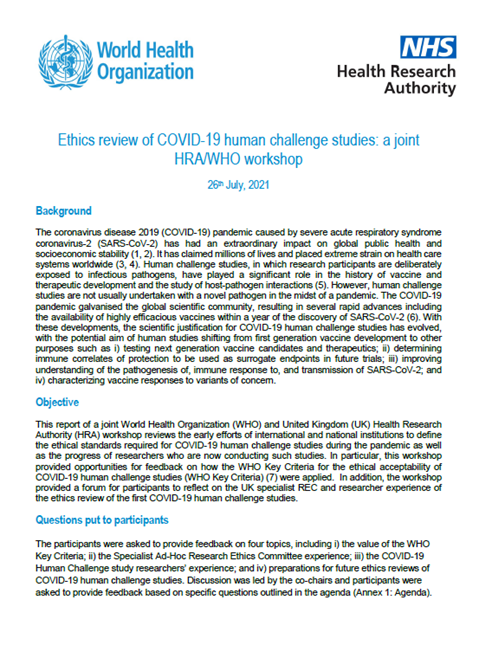Ethics review of COVID-19 human challenge studies: a joint HRA/WHO workshop

Overview
Background
The coronavirus disease 2019 (COVID-19) pandemic caused by severe acute respiratory syndrome coronavirus-2 (SARS-CoV-2) has had an extraordinary impact on global public health and socioeconomic stability. It has claimed millions of lives and placed extreme strain on health care systems worldwide (3, 4). Human challenge studies, in which research participants are deliberately exposed to infectious pathogens, have played a significant role in the history of vaccine and therapeutic development and the study of host-pathogen interactions (5). However, human challenge studies are not usually undertaken with a novel pathogen in the midst of a pandemic. The COVID-19 pandemic galvanised the global scientific community, resulting in several rapid advances including the availability of highly efficacious vaccines within a year of the discovery of SARS-CoV-2. With these developments, the scientific justification for COVID-19 human challenge studies has evolved, with the potential aim of human studies shifting from first generation vaccine development to other purposes such as i) testing next generation vaccine candidates and therapeutics; ii) determining immune correlates of protection to be used as surrogate endpoints in future trials; iii) improving understanding of the pathogenesis of, immune response to, and transmission of SARS-CoV-2; and iv) characterizing vaccine responses to variants of concern.
Objective
This report of a joint World Health Organization (WHO) and United Kingdom (UK) Health Research Authority (HRA) workshop reviews the early efforts of international and national institutions to define the ethical standards required for COVID-19 human challenge studies during the pandemic as well as the progress of researchers who are now conducting such studies. In particular, this workshop provided opportunities for feedback on how the WHO Key Criteria for the ethical acceptability of COVID-19 human challenge studies (WHO Key Criteria) were applied. In addition, the workshop provided a forum for participants to reflect on the UK specialist REC and researcher experience of the ethics review of the first COVID-19 human challenge studies.
